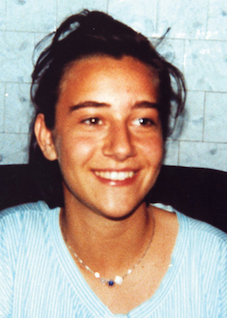Blessed Chiara Badano, St Foillan

Chiara 'Luce' Badano
Chiara Badano was born in the small town of Sassello in Savona, Italy, on 29th October 1971. Her parents were Maria Teresa and Ruggero Badano. They were a happy couple with a strong commitment to their Catholic faith and the sanctity of marriage. As they explain, from the time of their marriage they prayed constantly for the gift of a child.
'We got married at 26 and our greatest desire was to have children. Even after eleven years together, we continued to believe and pray that this would happen. Ruggero could not imagine a marriage without children so even when he was travelling - he was a lorry driver - he would continually pray that we could become parents. On one occasion, he asked God for this gift when he went to a shrine in our diocese. It happened and when Chiara was born we immediately felt she was not only our daughter, but first of all, she was God's child, and as such we had to raise her, respecting her freedom…'
Chiara was a happy child and grew to become a normal teenager. From childhood, her parents instructed her in her faith and included stories of Jesus in her bedtime reading. Her mother often tells the story of how Chiara, when she was young, shared her toys with other children and gave the best ones to other people! She also saved money to give to a friend who helped with a mission in Africa.
Her parish priest gave her a copy of the gospels when she made her first Holy Communion. Later, through her close friend, Chicca, she learnt about the Focolare Movement whose founder, Chiara Lubich, spoke about putting God in the first place in one's life and living out the gospel. Chiara was very attracted by these ideas: she was particularly struck when Chiara Lubich invited the young people who knew the Focolare Movement to "become a generation of saints". This became a clarion call for little Chiara, and she made her decision. Lubich never held back in speaking even to very young people about Jesus on the cross who she described as "Jesus Forsaken and Crucified". In 1983, little Chiara informed Chiara Lubich about her decision to see Jesus Forsaken as her first love or "Spouse." She had truly begun her spiritual journey.
Chiara Luce's favourite sport was tennis. One day, when she was playing, she felt "that sharp pain in my shoulder" and at the age of 17 she was diagnosed with osteosarcoma, the most aggressive and painful form of bone cancer.
Blessed Chiara Badano regarded Chiara Lubich as her spiritual guide. The latter suggested that she add "Luce" meaning "light" to her name - the 'light' of God that conquers the world. Her mantra became, "If you want it Jesus, I want it too." She offered up her suffering and refused morphine, 'because it takes away my clarity', and she said she wanted nothing 'but (her) sufferings to offer to Jesus.'
People close to her always experienced a sense joy and peace. A friend said: "I went there to console her instead she consoled me." She came to consider her approaching death as the consummation of her "marriage with her spouse" and asked to be dressed in a white wedding gown which, she said, should be very simple.
At dawn on the day of her death, she whispered these words in her mum's ear,
'Be happy because I am.'
On 3 July 2008, Pope Benedict XVI recognized her heroic virtue and declared her venerable. On 19 December 2009, the decree approving a miracle attributed to her intercession opened the way to her beatification, which was celebrated on 25 September 2010, at the Marian Shrine of Our Lady of the Divine Love near Rome.
Learn more Chiara on her website: www.chiarabadano.org/
Today is also the feast of St Foillan
Irish monk and missionary. St Foillan was a brother of St Fursey, a 7th century bishop. Together they travelled to East Anglia and established a monastery at Burgh Castle - the remains of which can be seen today. When Penda, King of Mercia invaded they fled to Neustria in France where they were well received by the local King, Clovis II.
St Foillan later founded a monastery at Fosses and worked as a missionary in Brabant. He was killed in 650 by bandits at Serette while on a visitation to the Irish monastic communities in Lagny and Peronne. The story of the two brothers was recorded by Bede and several other ancient writers.
Foillan was one of the many Irish missionaries who in the course of the seventh century evangelised France and Belgium, bringing the liturgy, building churches and founding many monasteries.
He is honoured and venerated both at Nivelles and Fosses. At Le Roeulx in Belgium, a monastery bears his name. He is the patron of Fosses, near Charieroi. In the Diocese of Namur his feast is celebrated on 31 October, in the Dioceses of Mechlin and Tournai on 5 November.












